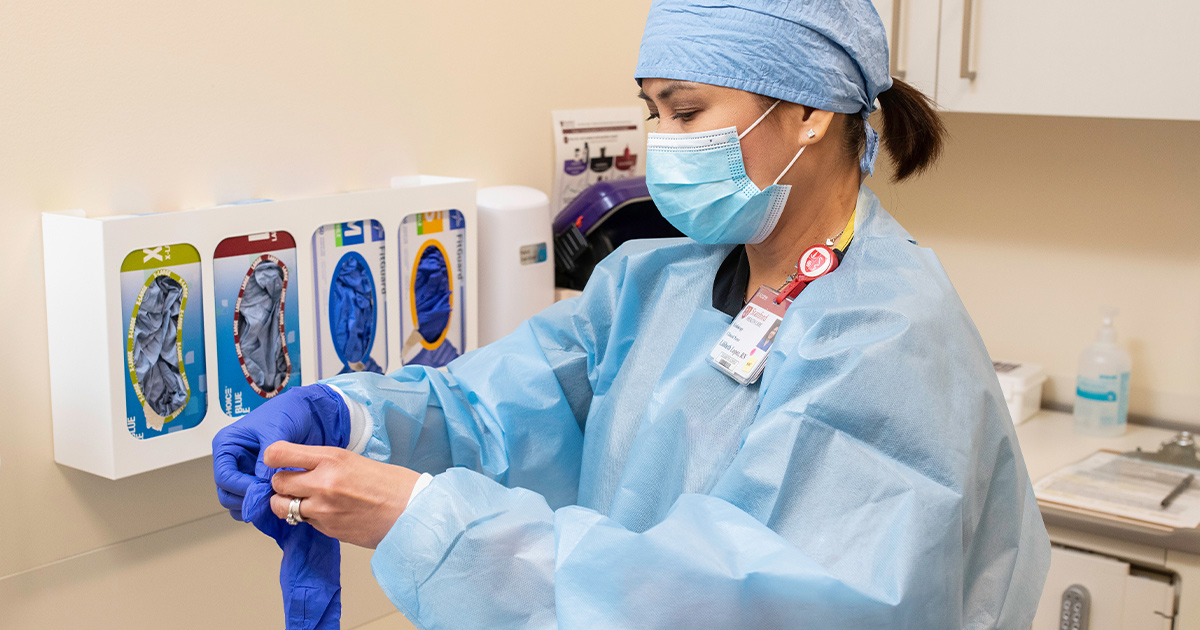Gynecology

Gynecology & Women’s Health Care
At Stanford Health Care Tri-Valley, we are dedicated to women’s health and wellness, offering a wide array of gynecology services tailored to your needs. From routine exams to surgical procedures, our caring specialists are honored to support your health. For expectant moms, we offer a full range of maternity services.
What We Offer You for Gynecology and Women’s Health
- Expertise in treating an array of conditions and health needs at every stage of a woman’s life, from premenstrual syndrome through menopause, and providing Pap smears and family planning. Go to Conditions Treated
- Advanced, personalized treatment options for serious and complex conditions, such as endometriosis, uterine fibroids, gynecologic cancers, and PCOS. Go to Treatments
- Team-based approach to diagnosis and treatment from caring, highly skilled gynecologists, cancer doctors, urogynecologists, and physical therapists. Go to Your Care Team
- Comprehensive support services to meet your health and wellness goals, including nutrition services, massage, exercise classes, and support groups. Go to Support Services
- Ease of access, with routine exams and leading-edge treatment close to home in a comfortable, compassionate environment. Go to Accessing Care
As part of our commitment to women’s health, we treat a range of common and complex conditions. We recognize that any concern—whether seemingly minor or more serious—merits attentive care.
We listen to your needs, recommend ways to reduce symptoms, and work with you to meet your health goals. In partnership with Stanford Health Care, our team of specialists treats concerns and conditions, including:
Abnormal Pap smear
A Pap test (also called a Pap smear) collects cells from the cervix to check for cervical cancer. We follow the most up-to-date guidance on managing and treating abnormal Pap smears to prevent cancer and avoid future complications.
If your Pap smear detects abnormal cells, we use additional screening tools to confirm your diagnosis. Using the latest techniques, we remove abnormal cells and check for any other concerns.
Our gynecologists specialize in minimally invasive surgery, using state-of-the-art technology to provide advanced, customized care.
Abnormal periods
We get to the root cause of irregular periods and offer relief for symptoms such as:
- Heavy bleeding
- Bleeding or spotting between periods
- Severe menstrual cramps, nausea or vomiting
- Skipped periods
Abnormal pregnancy
We offer compassionate care for abnormal pregnancies. Your choices may include medication, surgery, or pregnancy termination, depending on the cause. You’ll find caring treatment for:
- Blighted ovum: An egg that doesn’t develop into an embryo, resulting in pregnancy loss by eight weeks
- Ectopic pregnancy: A fertilized egg that remains outside the uterus, usually in a fallopian tube
- Fetal abnormality: A genetic or physical condition that affects the development and health of the baby, sometimes impairing the mother’s life
- Gestational trophoblastic disease (GTD): A group of rare tumors that develop in the early stages of pregnancy and include:
- Molar pregnancy: A placenta that forms without a fetus or with a partial fetus that can’t develop into a healthy baby
- Choriocarcinoma: A cancerous condition that may occur after a molar pregnancy, affecting only 0.004% of pregnancies
- Placental-site trophoblastic tumor: A tumor that develops where the placenta attaches to the lining of your uterus
- Epithelioid trophoblastic tumor: A tumor that forms after a full-term pregnancy, sometimes several years later
Endometriosis
In this painful disorder, uterine cells grow outside the uterus. We offer medical and surgical treatments for endometriosis, including:
- Painful and disruptive cramps
- Pain during intercourse
- Difficulty getting pregnant
- Bleeding or spotting
- Stomach pain
- GI problems, such as diarrhea or constipation
Fibroids
We offer a variety of treatments for fibroids. Treatments for these benign tumors in or near the uterus include:
- Birth control pills to reduce pain and menstrual bleeding
- IUD to reduce bleeding
- Minimally invasive techniques to break down fibroids
- Surgery (including minimally invasive techniques) to remove fibroids
Gynecologic cancer
We precisely diagnose and treat all gynecologic cancers using advanced surgical and minimally invasive procedures. Our specialists have expertise in treating:
- Cervical cancer
- Fallopian tube cancer
- Ovarian cancer
- Uterine cancer
- Vaginal cancer
- Vulvar cancer
Menopause
Because menopause affects every woman differently, our gynecologists create a personalized plan to reduce symptoms that interfere with your daily life. Symptoms we treat may include:
- Anxiety or depression
- Bone loss and osteoporosis
- Difficulty concentrating
- Difficulty sleeping
- Hot flashes
- Night sweats
- Vaginal dryness
Polycystic ovarian syndrome (PCOS)
Women with PCOS produce high levels of male hormones, leading to irregular periods and infertility. Depending on your needs, we prescribe medication or perform surgery.
Polyps
Polyps are small tumors that can grow on the cervix or uterus. We detect and treat polyps using:
- Hysteroscopy: A thin tube (hysteroscope) that checks for polyps in the uterus and removes them using small instruments
- Loop electrosurgical excision procedure (LEEP): An electric wire loop that removes polyps from the cervix
Premenstrual syndrome (PMS)
Our gynecologists offer treatments to relieve physical and emotional symptoms of PMS and premenstrual dysphoric disorder (PMDD), a more severe form of PMS. We address problematic symptoms before your period, including:
- Anxiety
- Depressed mood or mood swings
- Insomnia
- Headache
- Fatigue
Sexually transmitted infections (STIs) and HIV
We offer confidential, convenient, sensitive care for common STIs, with appointments within 24 hours and rapid STI testing. We use antibiotics to treat and cure STIs such as:
- Chlamydia
- Gonorrhea
- Syphilis
We also provide treatments to relieve symptoms of viral STIs, including genital herpes and genital warts.
Our doctors specialize in treating and managing HIV, offering these comprehensive services:
- Advanced antiretroviral therapy
- Primary care services
- Family planning and counseling
Urologic conditions
We offer medical treatments, physical therapy, and surgical treatments for all urologic conditions that affect women, including:
- Urinary incontinence: Loss of bladder control
- Urinary tract infection: An infection, typically in the bladder, that causes pain and burning when urinating
- Pelvic prolapse: Weakening of pelvic floor muscles that cause pelvic organs, such as the bladder, to drop into or out of the vagina
Vaginal infections
Our gynecologists treat these very common vaginal infections with antibiotics:
- Bacterial vaginosis: Overgrowth of bacteria that disrupts the natural balance of the vagina
- Trichomoniasis: STI caused by a tiny parasite called Trichomonas vaginalis
- Yeast infection: Overgrowth of yeast, typically Candida albicans, in the vagina
At Stanford Health Care Tri-Valley, we recognize that every woman is unique, with individual needs, preferences, and wellness goals. Whether you need a well-woman exam, a Pap test, or specialized services for a complex condition, our specialists can help.
Screening and Routine Care
Accurate screening can detect gynecological conditions early so you get needed care right away. In addition to providing thorough, precise exams, our gynecologists prioritize building a relationship with you. We are always happy to answer your questions and support you in caring for your health.
Our comprehensive screening and routine care include:
Well-woman exam
Regular well-woman exams are an essential part of managing your reproductive and overall health. Depending on your age and medical history, this yearly exam may include:
- Physical exam
- Breast health screening
- Pelvic exam
Pap test
A Pap smear collects cells from the cervix to check for cervical cancer. If your Pap test detects abnormal cells, we use additional screening tools to provide a diagnosis. We also offer the latest techniques to remove abnormal cells.
Birth control
Our gynecologists work with you to better understand your needs and goals to find the best birth control methods for you. We provide nonjudgmental, respectful care and a full range of birth control options, including:
- Birth control pills, patches, and rings
- Birth control implants
- Intrauterine devices (IUDs)
- Contraception for women with complex or chronic medical conditions
- Emergency contraception
Diagnostic Tools and Treatments
We conduct comprehensive, personalized evaluations using the latest diagnostic tools. Together with your team, we come up with a plan you feel comfortable with. We then use advanced medical techniques to treat your condition, provide relief, and help you manage your health.
Biopsy
Our gynecologists perform biopsies to check for abnormal or cancerous cells. Biopsies may involve taking tissue samples from the lining of the uterus and cervix.
Breast abnormalities
Our gynecologists and cancer doctors focus on early detection and diagnosis, using sophisticated, sensitive technology to achieve accurate results. We use ultrasounds, biopsies, and imaging techniques to produce precise images of the breast and pinpoint locations for tissue samples. An accurate diagnosis leads to faster, more effective treatment.
Cancer treatment
Our gynecologic oncologists have specialized training in treating all cancers that affect a woman’s reproductive system. When appropriate, we use leading-edge open and minimally invasive surgical techniques to remove tumors. Minimally invasive procedures result in less pain, reduced risk of complications, and a quicker recovery.
In addition to surgery, you have access to a complete range of medical and supportive services, including:
- Chemotherapy: Medications that destroy rapidly-growing cancer cells
- Hormone therapy: Hormones in pill, injection, or IUD form that block or reduce cancer-growing hormones
- Radiation therapy: High-energy waves that reduce or destroy cancer cells
- Cancer support groups: Monthly meetings with people who are living with or have recovered from cancer
Colposcopy
We use an instrument with magnifying lenses (colposcope) to examine your vulva, vagina, and cervix for abnormalities, such as inflammation and precancerous changes. Your doctor may take a biopsy during a colposcopy to check for cell changes.
D&C (dilation & curettage)
In this short surgical procedure, your gynecologist removes tissue from your uterus during or after a miscarriage. A D&C also can help diagnose or treat uterine bleeding from fibroids and polyps.
Endometrial ablation
This surgical procedure may be an option to reduce or stop menstrual bleeding when medication or an intrauterine device (IUD) doesn’t do enough. Ablation destroys the lining of the uterus with heat or other energy sources.
Fibroid removal
Our gynecologists perform open or minimally invasive procedures (myomectomies) to remove fibroids. Fibroid removal may preserve fertility for women who’d like to have children. The procedure depends on the size, number, and location of your fibroids:
- Abdominal myomectomy: A traditional, open surgery that removes large, numerous, or deeply embedded fibroids through an incision in your lower abdomen (belly)
- Hysteroscopic myomectomy: Removal of fibroids from the inner layer of the uterus through the vagina using a special scope, without any incisions
- Laparoscopic myomectomy: Minimally invasive procedure that removes a small number of fibroids, requiring tiny incisions and providing a faster recovery
- Robotic myomectomy: Minimally invasive technique that removes small fibroids or a small number of fibroids using robotic arms to guide surgical instruments through an incision in the abdomen
Hysterectomy
Our gynecological surgeons are skilled in performing both open and minimally invasive hysterectomies. We strive to use the least invasive procedure possible. Minimally invasive techniques reduce complications and create a smoother, faster recovery. Many patients even go home the same day as their surgery.
Our surgeons thoroughly discuss your options, making sure to tailor treatment to your specific condition and long-term goals. We perform:
- Vaginal hysterectomy: Removal of the uterus through the vaginal opening with no incisions on your abdomen
- Laparoscopic hysterectomy: Removal of the uterus using a small camera (laparoscope) and several tiny incisions (1 cm or less) on your abdomen
- Robotic hysterectomy: Removal of the uterus through small incisions in the abdomen to allow robotic arms and tiny surgical tools to access the uterus
- Abdominal hysterectomy: Removal of the uterus through an incision in the abdomen when:
- The uterus is too large to safely perform a minimally invasive procedure
- Your doctor believes this surgery is the safest and most effective for you
Pregnancy termination
We provide safe, supportive, and respectful care when you are considering pregnancy termination for elective reasons, to save the mother’s life, or because of a fetal abnormality. You have access to medical or surgical procedures.
Surgery for incontinence
When exercise and medication don’t resolve urinary incontinence, our surgeons offer procedures to correct the problem. Treatment can reduce or stop urine leakage and restore bladder control. Our procedures include:
- Laparoscopic Burch colposuspension: Stitches on both sides of the urethra that lift the vagina
- Urethral sling: A mesh sling that supports the urethra (the tube that carries urine)
Tubal ligation
For women who want to prevent pregnancy permanently, our surgeons can perform a tubal ligation. Known as “getting your tubes tied,” this surgical procedure blocks your fallopian tubes.
Vaginal reconstruction
Our surgeons perform vaginal reconstruction surgery to correct pelvic prolapse and incontinence. This procedure reinforces the wall between the rectum and vagina and the wall between the vagina and bladder.
Clinical Trials
Open trials refer to studies currently recruiting participants or that may recruit participants in the near future. Closed trials are not currently enrolling, but similar studies may open in the future.
Your Gynecology Care Team
At Stanford Health Care Tri-Valley, our doctors work closely with Stanford Health Care specialists to provide a precise diagnosis and personalized plan that honors your needs.

Your Doctors
Gynecologists
Gynecologists are medical doctors who have received four years of special training in obstetrics and gynecology. Gynecologists specialize in treating the female reproductive system, such as menstruation issues, STIs, and menopause.
View All GynecologistsGynecologists Trained in Minimally Invasive Surgery (MIS)
MIS gynecologists have received additional training in performing sophisticated minimally invasive surgical techniques. These doctors perform techniques including robotic myomectomies and hysterectomies.
View All Gynecologists Trained in Minimally Invasive Surgery (MIS)Gynecologic Oncologists
Gynecologic oncologists are gynecologists with advanced training in treating cancer of the reproductive organs. They will be the first doctor you see, and they will oversee all aspects of your care, from diagnosis to treatment to follow-up. They provide medical and surgical treatments and administer chemotherapy.
View All Gynecologic OncologistsUrogynecologists
Urogynecologists are doctors who specialize in gynecology and urology. They diagnose and treat pelvic floor disorders and perform reconstructive surgery.
View All Urogynecologists
Extended Care Team
Advanced Practice Providers (APPs)
Our team of APPs includes nurse practitioners who have extensive experience treating women with all kinds of gynecologic conditions.
Physical Therapists
For women who experience pelvic pain and urinary incontinence, physical therapists prescribe personalized exercises to strengthen pelvic muscles and reduce pain.

Support Services
We know that leading a healthy, fulfilling life means addressing both your physical and emotional needs. At Stanford Health Care Tri-Valley, we offer various support services to meet your personal needs and overall health goals. We offer:
- Support groups for individuals with different conditions, including cancer
Videos and Resources
Whether you’re coming in for a routine well-woman exam or having gynecologic surgery, we strive to make all of your appointments convenient and comfortable.
Convenient care where you live and work
- Insurance and billing: We accept most insurance plans. Please check with your health plan to confirm coverage.
- Self-pay pricing: Available by contacting Patient Financial Services at 1-800-549-3720, Monday through Friday, 8:00 a.m. to 4:00 p.m.
- MyHealth: Our MyHealth system allows you to access your records and test results from home, as well as communicate with your doctors.
